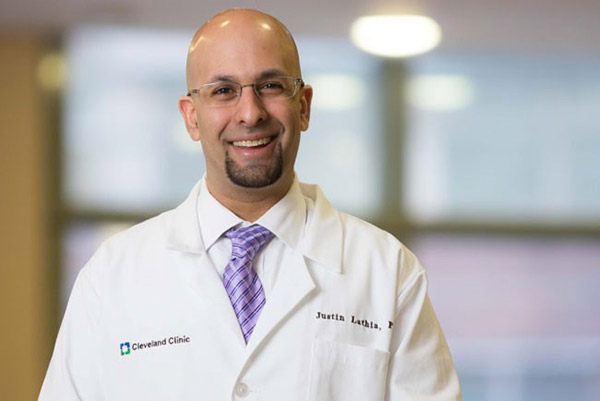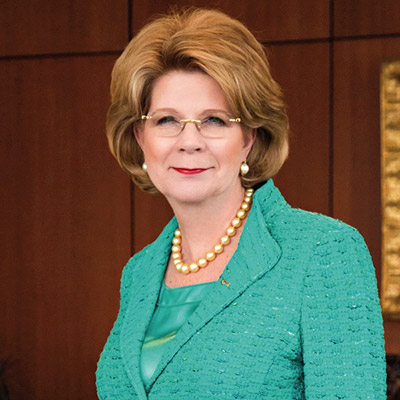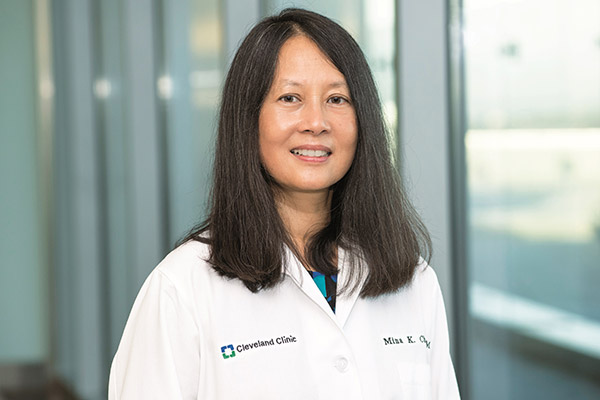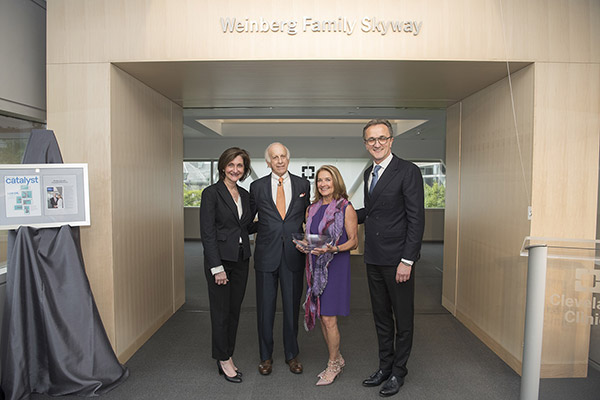If it Weren't for Funding From VeloSano...

“For us, it’s a catalyst,” Justin Lathia, PhD, says about the philanthropic support his lab receives from VeloSano, the year-round community-driven fundraising initiative to support lifesaving cancer research at Cleveland Clinic.
VeloSano’s flagship fundraising event, the annual “Bike to cure” weekend, took place this year on July 19-21. Since the inaugural ride in 2014, more than $17 million has been raised, with 100% of those funds supporting 115 cancer research projects across 11 different institutes and regional locations. Beyond the $17 million allocated by VeloSano, over $14 million in additional, external grants has been received due to the promise shown by VeloSano-funded projects.
“The unfortunate reality in research is that good ideas are a dime a dozen,” says Dr. Lathia, Vice Chair of the Department of Cardiovascular & Metabolic Sciences at Cleveland Clinic Lerner Research Institute. “The challenge is getting an idea funded and off the ground. For that you need proof of principle, you need preliminary data, you need a demonstration – because there’s nothing worse than not knowing if an idea will work. And that’s where philanthropy comes in.”
Dr. Lathia’s research focuses on glioblastoma, the highly aggressive form of brain cancer that took the lives of U.S. Senators John McCain and Ted Kennedy, and former National Institutes of Health (NIH) Director Bernadine Healy, who was Cleveland Clinic’s first female Chair of the Lerner Research Institute.
Dr. Lathia says to think about research funding like an investor: Would you invest in a company that doesn’t have a product? Would you invest in a company that doesn’t have a prototype? “The answer’s no, right?” he says. “So it’s that initial funding that we need in order to ratchet it up and get additional funding.”
VeloSano’s Pilot Awards Provide Essential Seed Funding
His lab has received three Pilot Awards from VeloSano. The funding from those awards furthered his research and already has helped secure several larger federal grants.
The first Pilot Award, in 2014, supported Dr. Lathia’s investigation into why glioblastoma are immunosuppressive – meaning that the body’s immune system doesn’t work properly to fight the tumor cells. “We have been laser-focused on a group of cells that sit in your bone marrow and only become activated during disease, so these cells are called suppressor cells,” he explains. “It turns out that suppressor cells seem to be really high in glioblastoma patient blood as well as in the tumor micro-environment. We’ve been working on this for a while, and one of the things we figured out is that we can actually kill them by giving low-dose chemo.”
This project led Dr. Lathia’s team to discover that there are differences in male and female glioblastoma. The team believes there are genetic differences in the immune system and differences in reaction overall to glioblastoma – which is a huge discovery, says Dr. Lathia. “This entire project started with me being wrong about a hypothesis and I feel like every time I’m wrong again, it gets more interesting,” he says, laughing. “To me, that’s the exciting, tantalizing part of research – when I’m wrong.”
This research now is in a Phase 1 clinical trial and, thanks to the seed funding from VeloSano, recently was awarded a prestigious, five-year, $2 million grant from the National Institute of Neurological Disorders and Stroke.
His lab received a second Pilot Award in 2016 to help fund another glioblastoma research project. “Over the past seven years my lab has been working to demonstrate that there are specific channels between cells that allow them to communicate with each other. These are really important for the cancer cells to grow and expand,” Dr. Lathia says. Although the research received an NIH R01 grant, the funding did not support the development of a drug therapy. The VeloSano grant provided support to try to develop inhibitors to a specific channel that’s only used by glioblastoma cells. The research continues and has a patent pending on the drug strategy.
The third Pilot Award was given last year and supports the research of cell-to-cell communication in triple negative breast cancer, the most aggressive type of breast cancer. Dr. Lathia’s team discovered that cancer stem cells play a significant role and that a protein once thought to suppress tumors actually may support tumor progression by aiding in cell-to-cell communication. Working collaboratively with Ofer Reizes, PhD, holder of The Laura J. Fogarty Endowed Chair for Uterine Cancer Research and a six-year VeloSano rider, the team is developing new therapies. They’ve already filed for a drug patent and have received promising feedback from a larger scale grant funder to support additional studies.
‘An Amazing Investment’
In addition to benefiting from VeloSano, Dr. Lathia participates, raising a minimum of $1,000 to ride 25 miles and serving as the captain of the Lerner Research Institute team. He says VeloSano weekend gives cancer researchers the rare opportunity to interact with the public about their work.
“At the Friday Night Kickoff Party during VeloSano weekend, I meet a lot of people; when I’m riding, I talk to people,” he says. “I thank them for riding and explain about the work in the lab. VeloSano really gives us the chance to tell the community what we do and what we’re up to in the lab. To me, it’s an amazing investment. And it’s done in a way that every single penny that is raised comes back to cancer research and is spent in a year.”
Dr. Lathia is passionate about his work at Cleveland Clinic. “This is something we do better than any other place I’ve seen,” he says. “We have the ability to move quickly to make an impact on human health.”
Beth E. Mooney Takes the Helm of Cleveland Clinic Board of Directors

A new era of leadership began this spring as Beth E. Mooney succeeded Robert E. Rich Jr. as chair of Cleveland Clinic’s Board of Directors.
The Board of Directors is the primary governing body of Cleveland Clinic and is composed primarily of community leaders who serve as volunteers and are not compensated for their services. Mr. Rich had served as the chair since 2011.
Ms. Mooney is the Chairman and Chief Executive Officer of KeyCorp. She has been named among “The World’s 100 Most Powerful Women” by Forbes and one of the Top 50 “Most Powerful Women in Business” by Fortune, as well as “Banker of the Year” by American Banker in 2017.
She takes the helm of the board at an important time as Cleveland Clinic works to complete its $2 billion fundraising campaign in time for its centennial celebration in 2021, advances its renewed five-year strategic plan and moves into its second century of patient care and community service.
“The impact made and the opportunities provided by Cleveland Clinic are immeasurable in northeast Ohio and around the world. I am honored and humbled by the opportunity to serve as chair of the Board of Directors,” Ms. Mooney said. “I am proud to be part of a team of professionals focused on ensuring that the mission, vision and values of Cleveland Clinic are present in all that we do.”
$3.7 Million Award from the American Heart Association to Focus on AFib Research

There are approximately 6 million people in the U.S. living with Atrial Fibrillation (Afib), an irregular beat in the heart’s upper chambers.
“Once it starts, AFib typically worsens over time, with episodes becoming longer and less likely to stop on their own,” says Mina Chung, MD, Director of the Center of Excellence in Cardiovascular Translational Functional Genomics. “Despite intense effort, there are few effective and safe therapies for AFib.”
Dr. Chung’s team, which includes specialists from the Lerner Research Institute and the Sydell and Arnold Miller Family Heart & Vascular Institute, has been working collaboratively for nearly 20 years. The researchers have published more than 40 major papers together, making significant contributions to the field of AFib mechanisms and cardiac genomics.
With philanthropic support from a variety of generous donors, they had the funds in 2017 to establish a Center of Excellence, which proved to be a catalyst for additional funding.
In 2018, the American Heart Association (AHA) awarded their center a $3.7 million grant for atrial fibrillation research. Led by Dr. Chung, the multidisciplinary team will focus on questions in AFib care, seek new therapies, and test lifestyle change programs that show promise in preventing worsening AFib.
Cleveland Clinic was one of six research institutions across the country selected to receive funding from the AHA’s new AFib Strategically Focused Research Network. The goal is to improve outcomes for patients with AFib.
“New therapies for AFib are critical,” Dr. Chung says, “and we are hopeful this award will have an extraordinary impact by leading to improved, personalized therapies for patients with this debilitating condition.”
She notes that her team also is working on extending this research to other conditions, including vascular, aortic, coronary, heart failure, pericardial and inherited cardiovascular diseases.
How You Can Help
Event Celebrates Weinberg Family's Generous Support of Research

Appreciation and inspiration filled the skyway on Cleveland Clinic’s main campus on June 17, 2019 as more than 70 supporters and caregivers gathered to honor Ronald E. Weinberg, his wife, Terri, and their family for their $30 million commitment to Cleveland Clinic’s Lerner Research Institute.
The skyway, which connects most of the buildings on the campus, was officially named the Weinberg Family Skyway in honor of the family’s generous commitment to support promising research for the benefit of future patients.
Mr. Weinberg is a member of Cleveland Clinic’s Board of Directors and chairs its Research and Education Committee. His family’s commitment supports new initiatives advancing medical research launched by Serpil Erzurum, MD, Chair of the Lerner Research Institute and holder of the Alfred Lerner Memorial Chair in Innovative Biomedical Research.
During the event, Dr. Erzurum thanked the Weinbergs for understanding and prioritizing the need for funding research. “You recognize that thousands of patients walk this skyway every day with conditions that threaten their lives, or their family members’ conditions that disrupt their wellness and quality of life,” she said. “You recognize that we at Cleveland Clinic have the passion and expertise to change lives—to reimagine care for patients around the world. We humbly thank you.”
Tom Mihaljevic, MD, CEO and President of Cleveland Clinic, recognized the Weinbergs for their generosity and dedication to Cleveland Clinic. “Ron and Terri have a long history with our institution, and both have served as tremendous volunteer leaders,” he said.
As Dr. Mihaljevic unveiled the sign to the newly named Weinberg Family Skyway, he invited Mr. Weinberg to the podium. “I feel a sense of pride and humility for having such a great institute right where we live,” Mr. Weinberg said. “Cleveland Clinic serves as an influential force not only in our own community, but worldwide.”
Mr. Weinberg drove home the importance of having the ability and resources to expand and improve research for the future of healthcare. “The technology people are being treated with every single day did not exist 20 or 30 years ago… Today’s research is tomorrow’s clinical practice.”

